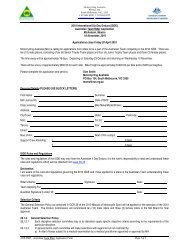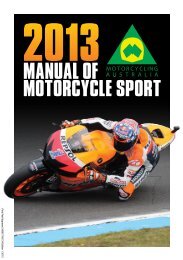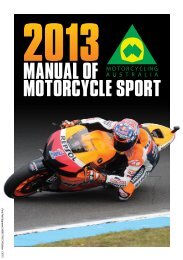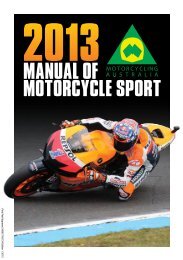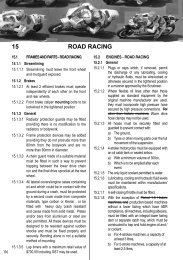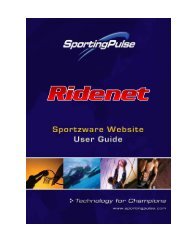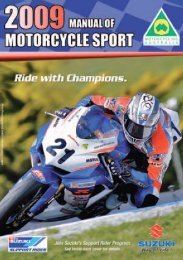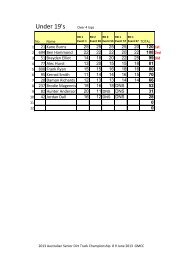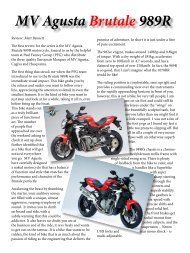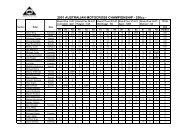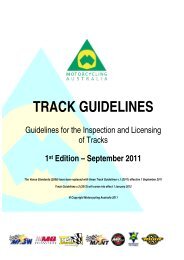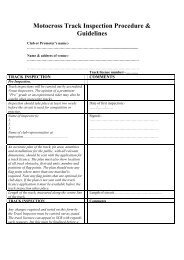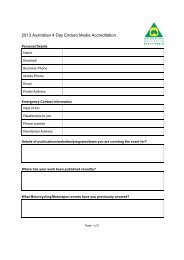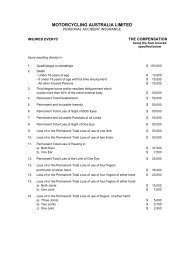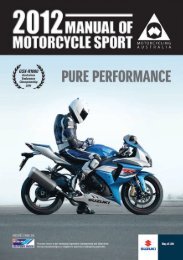2008 Manual of Motorcycle Sport - Motorcycling Australia
2008 Manual of Motorcycle Sport - Motorcycling Australia
2008 Manual of Motorcycle Sport - Motorcycling Australia
You also want an ePaper? Increase the reach of your titles
YUMPU automatically turns print PDFs into web optimized ePapers that Google loves.
mOTORCYCLING AUSTRALIa media guide<br />
The do’s and don’ts <strong>of</strong> interviews<br />
You don’t <strong>of</strong>ten get a chance to be on television, right?<br />
When that chance comes, you don’t want to blow it.<br />
Here are a few helpful hints and suggestions which will<br />
be useful the next time a microphone and television<br />
camera are thrust in your face after finishing a race.<br />
• Think before you speak. What’s the most<br />
important thing you want to say? [This<br />
might not be the answer to the question<br />
you’ve just been asked.]<br />
• Keep it short and pithy.<br />
• Don’t avoid being controversial [but don’t<br />
slag <strong>of</strong>f other riders].<br />
• Think about how you can maximise<br />
publicity.<br />
• Practice makes perfect and the more you<br />
get used to the idea <strong>of</strong> being interviewed,<br />
the easier it will be when the moment<br />
actually arrives.<br />
Practice speaking into the mirror or ask a friend or team<br />
mate to help you by conducting mock interviews.<br />
Here is an example <strong>of</strong> what might happen the next time<br />
you race.<br />
You’ve just finished first, second or third in a televised<br />
round <strong>of</strong> an <strong>Australia</strong>n Championship, or any other<br />
major motorcycling event.<br />
You take <strong>of</strong>f your sweaty helmet, run your hands<br />
through your drenched hair, put on your sponsor’s cap,<br />
and confront the lens <strong>of</strong> the television camera that is<br />
now pointed at you.<br />
The interviewer opens the dialogue with an open-ended<br />
question such as:<br />
“Congratulations, [your name]. That was a good ride.<br />
You must be pretty happy”<br />
This may be your one chance to establish yourself in<br />
the eyes <strong>of</strong> the television audience [and sponsors] as<br />
something more than yet another race-track clone.<br />
Don’t blow it.<br />
Don’t answer with something like:<br />
“Yeah, no…yeah. The guys in the crew were fantastic<br />
today. I’m like…wow. My Pyong Ying tyres were great.<br />
I coulda done better but the suspension wasn’t quite<br />
dialled in. We’re still muckin’ round with the settings.”<br />
Do say:<br />
“People wonder why I use Pyong Ying tyres, but with<br />
what we know about setting up the bike, they’re worth<br />
1.5 seconds over the Rollingstones around here.”<br />
The next question may be, “You seemed to get faster<br />
as the race went on.”<br />
Don’t say:<br />
“Yeah, no…yeah. You sorta get into a rhythm sort <strong>of</strong><br />
thing, you know? Yeah, no...it was good.”<br />
Tips to remember<br />
Some sub-editors are, if not lazy, unwilling to work any harder than necessary. Confronted with the usual drivel<br />
that emerges from sporting telecasts, the result is usually invisible. If you want to attract publicity, give the media<br />
workable material.<br />
• Do take elocution lessons.<br />
• Don’t say ‘yeah’ or ‘nah’. The word is ‘yes’ or ‘no’.<br />
• Don’t say ‘yeah, no’ – it really doesn’t mean anything. • Get your teeth fixed if necessary!<br />
• Say something meaningful.<br />
• Avoid clichés.<br />
• Don’t mumble – speak clearly.<br />
• Don’t fiddle with your cap.<br />
Look into the eyes <strong>of</strong> the interviewer, make him (or her) believe that you have a story to tell. Create a personality<br />
for yourself. Give facts, not waffle.<br />
Be positive and focussed. Try not to feel nervous.<br />
Good television is entertaining and the most important people you have to entertain in the first instance are those<br />
deciding what ends up on the cutting room floor - editors. Not necessarily the audience – because editors decide<br />
whether the audience will even get a chance to see you.<br />
It’s up to you to tell – and sell – your story!<br />
32 enjoy the ride<br />
<strong>2008</strong> MANUAL OF MOTORCYCLE SPORT



